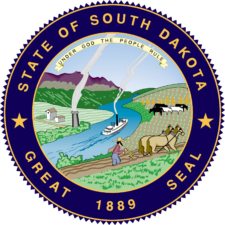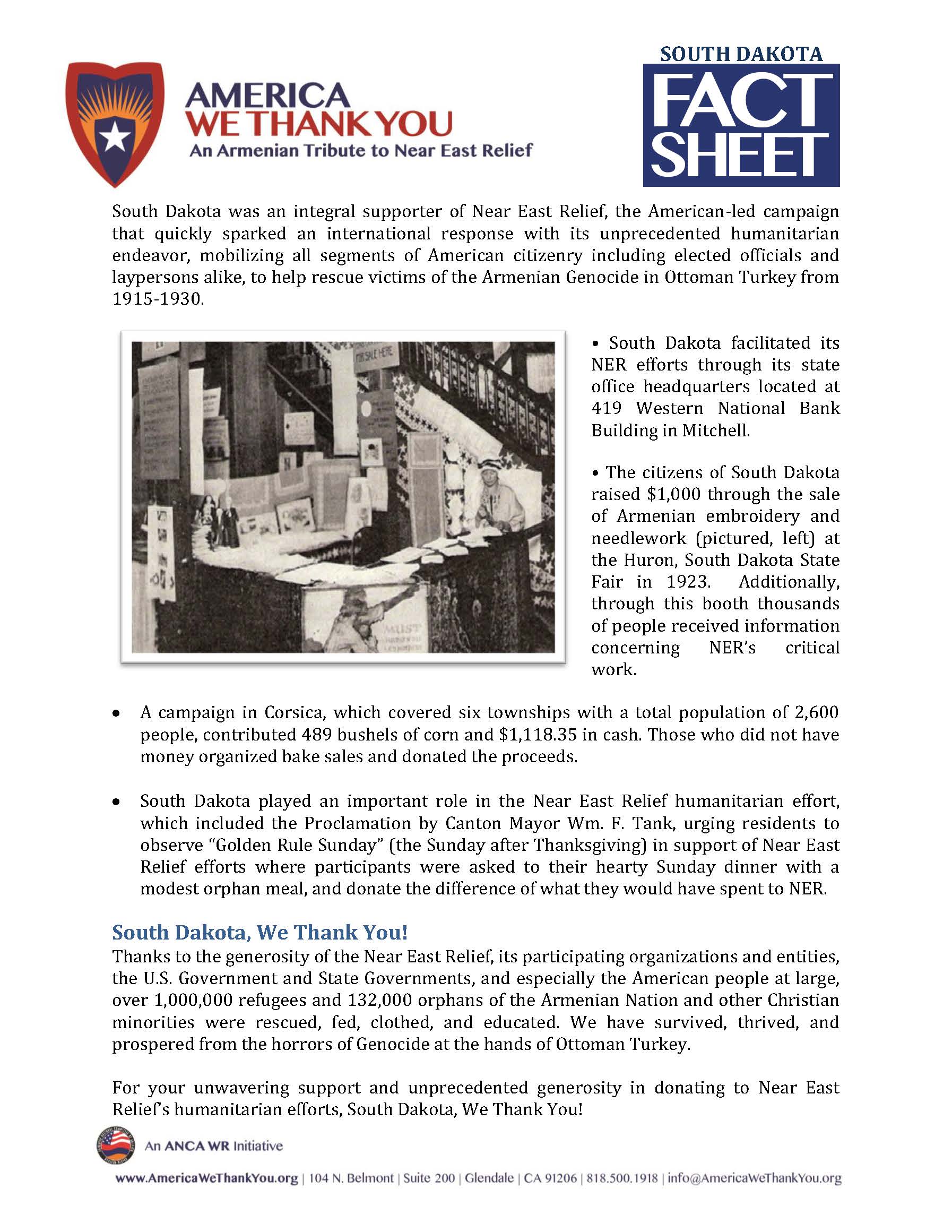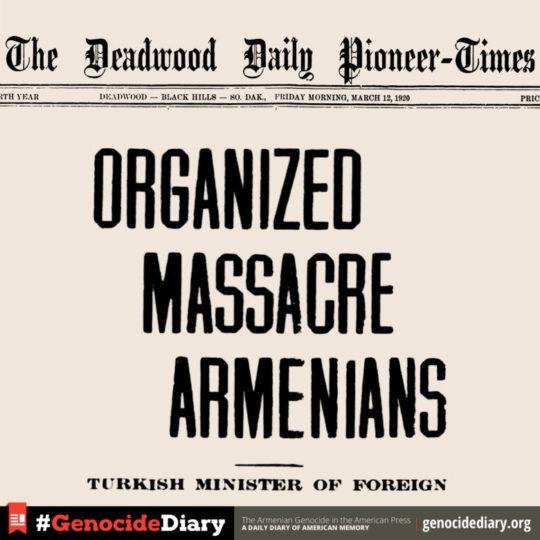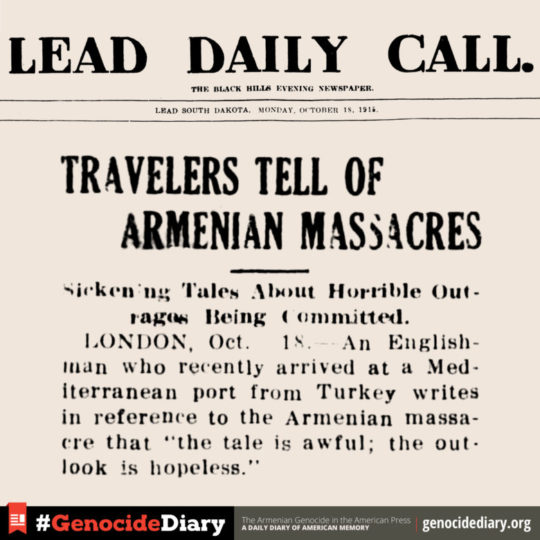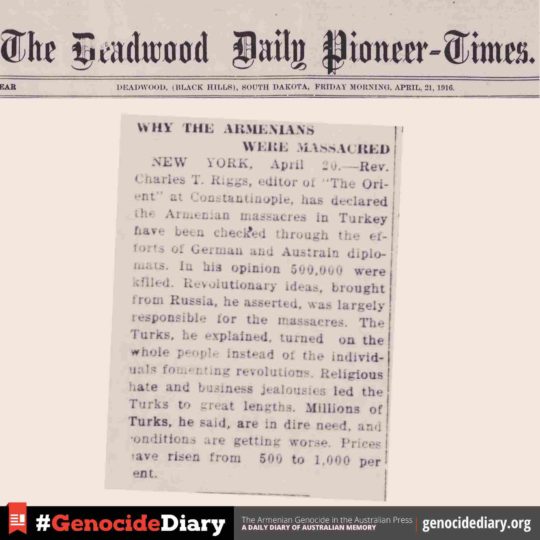State of South Dakota
NINETIETH SESSION LEGISLATIVE ASSEMBLY, 2015
922W0724
HOUSE CONCURRENT RESOLUTION NO. 1009
Introduced by: Representatives Hickey, Bartling, Beal, Bolin, Brunner, Craig, Gibson, Gosch, Haggar (Don), Haugaard, Kaiser, Klumb, Schoenbeck, Schrempp, Stalzer, Stevens, Verchio, Willadsen, and Wink and Senators Bradford, Ewing, Holien, Novstrup (David), Olson, Peterson (Jim), Rampelberg, Rusch, and Van Gerpen
A CONCURRENT RESOLUTION, Designating 2015 as the “Year of Remembrance for the Centennial Since the Commencement of the Armenian Genocide of 1915-1923” in South Dakota and urging Congress and the President of the United States to formally and consistently recognize and reaffirm the historical truth that the atrocities committed against the Armenian, Greek, and other Christians living in their historical homelands in Anatolia constituted genocide and to work towards equitable, stable, and durable Armenian-Turkish relations and a fair, just, and comprehensive international resolution of this crime against humanity;
WHEREAS, during the Armenian Genocide of 1915-1923, one million five hundred thousand men, women, and children of Armenian descent, and hundreds of thousands of Assyrian and Greek descent, lost their lives at the hands of the Ottoman Turkish Empire in its attempt to systematically eliminate the Armenian race; and
WHEREAS, April 24, 1915, is globally observed as the commencement of the Armenian Insertions into existing statutes are indicated by underscores. Deletions from existing statutes are indicated by overstrikes. 170 copies were printed on recycled paper by the South Dakota Legislative Research Council at a cost of $.098 per page. Genocide because the arrest on that day, and subsequent execution, of several hundred Armenian leaders alerted the world about the Ottoman Turks’ genocidal plan; and
WHEREAS, despite Armenians’ historic presence, stewardship, and autonomy in the region, Turkish rulers of the Ottoman Empire subjected Armenians to severe and unjust persecution and brutality including widespread and wholesale massacres beginning in the 1890s, most notably the Hamidian Massacres from 1894 to 1896 and the Adana Massacre of 1909; and
WHEREAS, the earlier massacres and subsequent genocide of the Armenians and other Christian peoples constitute one of the most atrocious violations of human rights in the history of the world; and
WHEREAS, these crimes against humanity not only resulted in the killing of unprecedented numbers of innocent peoples, but also had the consequence of permanently removing all traces of the Armenians and other targeted peoples from their historic homelands of more than three millennia, and enriching the perpetrators with the lands and other property of the victims of these crimes, including the usurpation of several thousand churches; and
WHEREAS, by consistently remembering and forcefully condemning the atrocities committed against the Armenians, and honoring the survivors as well as other victims of similar heinous conduct, we guard against repetition of such acts of genocide and provide the American public with a greater understanding of history; and
WHEREAS, this measure would declare that the Legislature deplores the persistent, ongoing efforts by any person, in this country or abroad, to deny the historical fact of the Armenian Genocide; and
WHEREAS, the failure of the international community to hold responsible nations accountable for crimes against humanity results in travesty of justice, and sets a negative precedent; and
WHEREAS, the United States is on record as having officially recognized the Armenian Genocide in the United States government’s May 28, 1951, written statement to the International Court of Justice regarding the Reservations to the Convention on the Prevention and Punishment of the Crime of Genocide, through President Ronald Reagan’s April 22, 1981, Proclamation 4838, and by Congressional legislation including House Joint Resolution 148 adopted on April 8, 1975, and House Joint Resolution 247 adopted on September 10, 1984; and
WHEREAS, even prior to the Convention on the Prevention and Punishment of the Crime of Genocide, the United States has a record of having sought to justly and constructively address the consequences of the Ottoman Empire’s intentional destruction of the Armenian people, including through Senate Concurrent Resolution 12 adopted on February 9, 1916, Senate Resolution 359 adopted on May 11, 1920, and President Woodrow Wilson’s November 22, 1920, decision entitled, “The Frontier between Armenia and Turkey”; and
WHEREAS, on April 24, 2013, the President of the United States stated, “A full, frank, and just acknowledgment of the facts is in all of our Nations grow stronger by acknowledging and reckoning with painful elements of the past, thereby building a foundation for a more just and tolerant future”; and
WHEREAS, President Obama entered office having stated his “firmly held conviction that the Armenian Genocide is not an allegation, a personal opinion, or a point of view, but rather a widely documented fact supported by an overwhelming body of historical evidence” and affirmed his record of “calling for Turkey’s acknowledgment of the Armenian Genocide”; and
WHEREAS, in response to the Genocide and at the behest of the President Woodrow Wilson and the S. State Department, the Near East Relief organization was founded and was provided unprecedented complete access to all S. government documents and files concerning the plight of Christian minorities; and
WHEREAS, Near East Relief was the first Congressional-sanctioned American philanthropic effort created exclusively to rescue the Armenian Nation and other Christian minorities from annihilation after S. Ambassador to Constantinople Henry A. Morgenthau, pled for assistance upon personally witnessing the systematic massacre of Armenians; and
WHEREAS, Near East Relief’s efforts resulted in delivering one hundred seventeen million dollars of assistance between 1915 and 1930, including the delivery of food, clothing, and materials for shelter, setting up refugee camps, clinics, hospitals, and orphanages; and
WHEREAS, the generous philanthropy of the American people directly resulted in the salvation of the Armenian and Assyrian refugees nation from being completely annihilated by the Genocide by saving more than one million refugees, including more than one hundred thirty thousand orphans through their humanitarian assistance; and
WHEREAS, Near East Relief evolved into the Near East Foundation in 1930, and continues to provide humanitarian aid to people throughout the Middle East and Africa; and
WHEREAS, South Dakota is home to a vibrant Armenian-American community who have enriched our state through their leadership and contribution in business, agriculture, academia, government, and the arts; and
WHEREAS, the State of South Dakota endeavors to encourage and promote a curriculum relating to human rights and genocide in order to empower future generations to prevent the recurrence of genocide; and
WHEREAS, April 24, 2015, will mark the centennial anniversary since the commencement of the Armenian Genocide; and
WHEREAS, Armenians in South Dakota, and throughout the world, have not been provided with justice for the crimes perpetrated against the Armenian nation despite the fact that a century has passed since the crimes were first committed; and
WHEREAS, the Armenian people, in South Dakota and elsewhere, remain resolved and their spirit continues to thrive a century after their near annihilation;
NOW, THEREFORE, BE IT RESOLVED, by the House of Representatives of the Ninetieth Legislature of the State of South Dakota, the Senate concurring therein, that the Legislature hereby designates the year of 2015, as “South Dakota Year of Remembrance for the Armenian Genocide of 1915-1923”; and
BE IT FURTHER RESOLVED, that the Legislature urges the Republic of Turkey to acknowledge the facts of the Armenian Genocide and to work toward a just resolution; and
BE IT FURTHER RESOLVED, that the Legislature commends its conscientious educators who teach about human rights and genocide, and calls upon them to continue to enhance their efforts to educate students at all levels about the experience of the Armenians and other crimes against humanity; and
BE IT FURTHER RESOLVED, that the Legislature hereby commends the extraordinary service which was delivered by Near East Relief to the survivors of the Armenian Genocide and Assyrian Genocide, including thousands of direct beneficiaries of American philanthropy who are the parents, grandparents, and great-grandparents of many Armenians and Assyrians; and
BE IT FURTHER RESOLVED, that the Legislature respectfully calls upon the Congress and the President of the United States to act likewise and to formally and consistently recognize and reaffirm the historical truth that the atrocities committed against the Armenian people constituted genocide.
